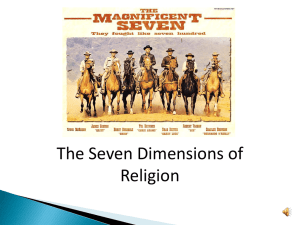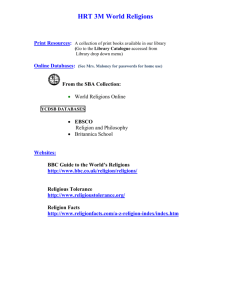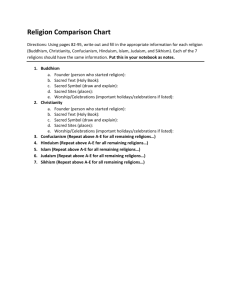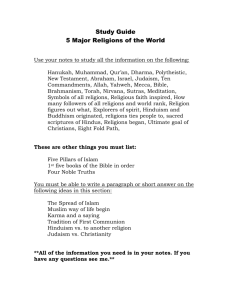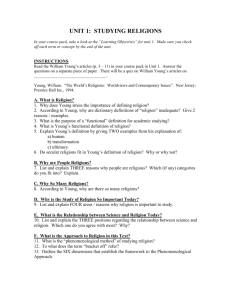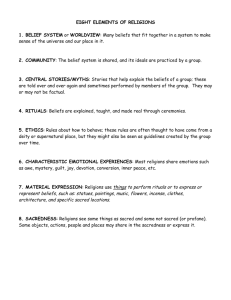Methodological Agnosticism
advertisement
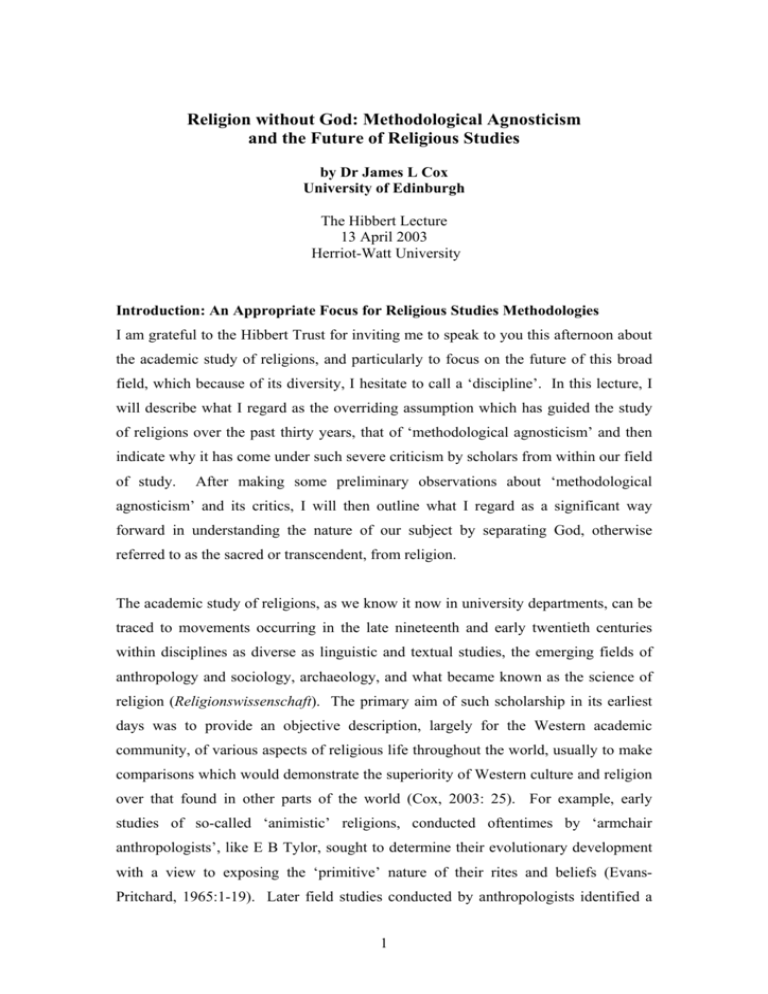
Religion without God: Methodological Agnosticism and the Future of Religious Studies by Dr James L Cox University of Edinburgh The Hibbert Lecture 13 April 2003 Herriot-Watt University Introduction: An Appropriate Focus for Religious Studies Methodologies I am grateful to the Hibbert Trust for inviting me to speak to you this afternoon about the academic study of religions, and particularly to focus on the future of this broad field, which because of its diversity, I hesitate to call a ‘discipline’. In this lecture, I will describe what I regard as the overriding assumption which has guided the study of religions over the past thirty years, that of ‘methodological agnosticism’ and then indicate why it has come under such severe criticism by scholars from within our field of study. After making some preliminary observations about ‘methodological agnosticism’ and its critics, I will then outline what I regard as a significant way forward in understanding the nature of our subject by separating God, otherwise referred to as the sacred or transcendent, from religion. The academic study of religions, as we know it now in university departments, can be traced to movements occurring in the late nineteenth and early twentieth centuries within disciplines as diverse as linguistic and textual studies, the emerging fields of anthropology and sociology, archaeology, and what became known as the science of religion (Religionswissenschaft). The primary aim of such scholarship in its earliest days was to provide an objective description, largely for the Western academic community, of various aspects of religious life throughout the world, usually to make comparisons which would demonstrate the superiority of Western culture and religion over that found in other parts of the world (Cox, 2003: 25). For example, early studies of so-called ‘animistic’ religions, conducted oftentimes by ‘armchair anthropologists’, like E B Tylor, sought to determine their evolutionary development with a view to exposing the ‘primitive’ nature of their rites and beliefs (EvansPritchard, 1965:1-19). Later field studies conducted by anthropologists identified a 1 wide range of subjects, frequently focusing on the ‘exotic nature’ of rituals practised in non-Western societies. (Mbiti, 1969: 6-10). Scholars working within the phenomenology of religion, such as Friedrich Heiler or W Brede Kristensen, emphasised ‘understanding’ religions, but almost always from within Western theological categories such as belief in a Supreme Being, concepts of evil and how salvation is effected (Cox, 1995: 339-55). Especially since the publication of Peter Berger’s The Sacred Canopy (1967) and Ninian Smart’s The Science of Religion and the Sociology of Knowledge (1972), the academic study of religions has been dominated by the concept that the scholar of religions, for methodological purposes, makes no comment on the truth, reality or value of the religious communities under study. In traditional phenomenology of religion, this has been associated with the idea of epochē, from the Greek meaning to hold back, which phenomenologists take to refer to a process whereby scholars suspend their personal judgements about any religion whilst they are engaged in their academic work. Berger referred to this as ‘methodological atheism’, which he defined as a process of bracketing ‘the ultimate status of religious definitions of reality’. Smart argued that the term ‘methodological atheism’ implies that scholars must deny the possibility that the objects of religious faith are true or real. Smart preferred the phrase ‘methodological agnosticism’, which the American scholar of religions, Russell McCutcheon, summarises in the following way: ‘Not knowing how the universe really is organized – not knowing if it is organized at all – the scholar of religion seeks not to establish a position in response to this question but to describe, analyse, and compare the positions taken by others’ (McCutcheon, 1999: 216-17). Thus, the idea that academics must adopt a neutral, value-free position with respect to the study of religions and restrict themselves to the tasks of describing, classifying and comparing religious phenomena has come to define even up to today mainstream thinking among scholars of religions within departments of religious studies in Western academic institutions. An excellent example of this approach is demonstrated by Walter van Beek and Thomas Blakely, in their edited volume published in 1994 under the title Religion in Africa. In their introduction, Van Beek and Blakely define religion as ‘human interaction with a culturally postulated nonfalsifiable reality’ (1994: 2). 2 They emphasise through this definition that religion is a culturally specific human response to what must always remain from a scientific perspective a merely postulated, but entirely nonfalsifiable reality. Van Beek and Blakely suggest that this definition safeguards the study of religions from theology. Just like other disciplines in the human sciences, such as anthropology, psychology or sociology, scientific approaches within the study of religions seek to understand and interpret aspects of human religious behaviour, without passing judgements on their truth or value. This approach is methodological in the sense that it employs techniques of description and observation to arrive at an understanding of the phenomena under study. It is agnostic, since what is nonfalsifiable cannot be observed and hence cannot be known. Van Beek and Blakely explain: Most people do not claim that they can -at will- directly observe God, an ancestor, or a witch at work. However, this does in no way detract from the reality of widely held beliefs. In fact, the fundamental impossibility to falsify religious content is one major foothold of religion and a source of the bewildering variation and multiplicity of its forms (p. 1). This position, which I have called mainstream, has come under increasing criticism in recent years, primarily from those who employ post-modern and post-colonial analyses. Post-modern scholars have argued that no ‘objective’ or reified knowledge of religious communities is attainable and that every scholar is situated ideologically in space and time. As David Hufford (1999: 294) puts it: ‘Because scholars are human beings, the study of human life is always and inescapably reflexive. Humans study humans.’ Post-colonial critique argues also for a recognition of the relative positions between the scholar and those studied, but this is often couched in terms of power relations. The study of religions looks very different from the vantage point of the oppressed than it does from that of the detached observer (Chidester, 1996). This point has been underscored by Terence Ranger (1996: 271-72) who argues that the traditional methods of Western social anthropology are inadequate for understanding contemporary cultures in the former imperial colonies. ‘The old colonial relations of dominance and authority need to be replaced by social science as dialogue, as participation’. An excellent example of a social scientist who opposes methodological agnosticism is Michael Bourdillon, an anthropologist from the University of Zimbabwe. In an article 3 discussing anthropological approaches to African religions, Bourdillon (1995) argues that academic neutrality on religious matters is based on the flawed premise that the scholar of religion can or should exclude personal judgements from academic discourse. Bourdillon contends that ‘our personal judgements are relevant to academic debate, and academic debate can affect our personal judgements’. By accepting this, scholars acknowledge that they view reality from limited perspectives. ‘If we are aware of our limitations, we can enter into academic debate in an undogmatic way, ready to listen and to learn’. The best way to do this, rather than denying that we hold personal judgements, is to ‘make explicit the value judgements behind our academic work’ (p. 151). Methods in the Study of Religions: Separating the ‘Sacred’ from ‘Religion’ It will be clear from these brief references to the post-modern and post-colonial critiques of methodological agnosticism that the academic study of religions has always been situated, that it has never been neutral or ‘value-free’. It has aligned itself with a particular form of rational discourse that has sought understanding without endorsing or denying a believer’s point of view. At the same time, for methodological reasons it disguised the identity and perspective of the scholar of religions by ‘bracketing out’ pre-conceived notions whilst adopting a fully empathetic attitude towards the religious communities under study. Although it has not been acknowledged by scholars of religion generally up to this time, this position, perhaps unwittingly, or in some cases surreptitiously, has assumed a theological starting point. The academic study of religions, by its insistence on methodological agnosticism, has adopted a form of liberal theology, where the universal transcendent becomes the defining focus for the study of religion. This argument has been put forward convincingly by Timothy Fitzgerald of the University of Stirling in his controversial book, The Ideology of Religious Studies (2000). Fitzgerald contends that scholars writing within the academic study of religions have used the concept ‘methodological agnosticism’ in support of their claim that religion comprises a distinct category for study, sui generis, in a classification of its own, requiring its own peculiar methodologies. But, he asks, what makes religion somehow distinct, sui generis, and unique? The only available answer, according to Fitzgerald, must be its transcendental referent, variously called God, the sacred or the 4 ultimate. This is because, by definition, methodological agnosticism, although ostensibly refusing to investigate the transcendent, bases its claim to methodological uniqueness precisely on its agnostic position in relation to the transcendent. However, when this becomes the defining focus for its methodology, we are no longer in the realm of the social sciences, but theology, which also bases its methodologies in relation to the study of that which is entirely non-falsifiable. Nowhere can this be seen better, according to Fitzgerald, than in the writings of Ninian Smart, whom we have noted is the figure (in the English speaking world at least) most prominently associated with championing methodological agnosticism. Fitzgerald agrees, noting that Smart in particular is associated with the movement to make the study of religion non-reductive to other disciplines in the social sciences while retaining a non-theological approach. He contends, however, that, rather than somehow bridging the gap between social scientific reductionism and theology, Smart actually becomes entangled in a massive contradiction. Throughout his many writings, Smart maintains, according to Fitzgerald, an essentialist, reified concept of religion, but soon runs into difficulties and is forced to identify ‘religion-like’ characteristics in non-religious ideologies such as nationalism, Marxism, Freudianism and sport (Smart, 1997: Fitzgerald, 2000: 54-71). According to Smart, we know and study religions through its dimensions: ritual, mythological, doctrinal, ethical, experiential and social. (Smart, 1969: 15-25). Religious manifestations vary from culture to culture, but an essence, called religion, transforms itself into particular cultural and social expressions. Fitzgerald (2000: 56) calls this an imagery ‘of a primary substance, an essence, taking on some of the secondary properties of the institutional media through which it manifests itself’. Religion-like ideologies thus possess many of the dimensions of religion, including ritual, myth, beliefs and community, but they lack the dimension of the sacred. This is why they only resemble religions. For Fitzgerald, this means that Smart, despite his attempt to develop an approach to the study of religions which can be reduced neither to the social sciences nor to theology, fails, precisely because he retains a theological perspective by insisting that the ‘sacred’ comprises the unique focus of religion. 5 Fitzgerald contends that, as non-theological scholars of religion, the object of our investigation is not a transcendental referent, since that cannot be investigated using methods that are open to the natural and human sciences. The object of our study is the social, expressed in diverse ways throughout human cultures. However we may differ in the way we want to define these terms, we still need to be able to say that all humans live in societies, meaning that humans are social beings; and we still need to be able to say that all societies have cultures, however complex these may be. …If “religion” is used at the level of generality…, then “religion” is simply synonymous with “culture” (p. 245). If the object of our study is defined by societies and their attendant cultures, then the methods employed in scholarly research belong very much within the social sciences. Methods unique to religion thus do not exist unless scholars of religion either surreptitiously or unwittingly smuggle onto their agenda theological motives. Fitzgeralds’s analysis pushes the academic study of religions, with its emphasis on methodological agnosticism, into theology, or it forces scholars of religion into the study of social or cultural practices, and thus seems to eliminate a field which we designate ‘religious’ studies. In universities, therefore, departments of Religious Studies would possess no ground, no position of their own, and would be subsumed either within theology schools or within social science departments that are devoted to the study of human cultures. This position seems inevitable, unless we can uncouple the sacred, God or Fitzgerald’s transcendental referent from ‘religion’. Separating the Sacred from Religion The French sociologist, Danièle Hervieu-Léger has attempted to do just that in a book first published in French in 1993, with the English version appearing in 2000 under the title Religion as a Chain of Memory. Hervieu-Léger notes that most scholars of religion have understood the ‘sacred’ in the way that Fitzgerald implies, as ‘a tangible reality, a subject which can be identified by its properties and that is generally to be found in every religion’, such as, ‘mysterious power, total separation between a sacred and profane world and an ambivalence which renders the sacred an object at once of fascination and revulsion’ (2000: 49). This way of thinking transforms the concept of sacredness from an adjective into a noun, and thereby renders the sacred the unique 6 subject matter of all religions (p. 49). This is why for Fitzgerald, in so far as the study of religion is defined by its focus of faith, it will always be theological. Hervieu-Léger counters that the sacred does not constitute the subject matter of religion and that religion cannot be defined in terms of the experience of the sacred. Rather, religion exists when ‘the authority of tradition’ has been invoked ‘in support of the act of believing’ (p. 76). In this way, religion becomes associated with the authoritative transmission of tradition. ‘As our fathers believed, and because they believed, we too believe’ (emphasis hers). ‘Seen thus, one would describe any form of believing as religious which sees its commitment to a chain of belief it adopts as allabsorbing’ (p. 81). The sacred, by contrast, confers on objects, symbols or values that which results in a feeling of radical dependence ‘experienced, individually and/or collectively, in emotional contact with an external force’ (p. 106-107). This implies that people who experience the sacred obtain a sense of encountering a force or a power that is greater than themselves. Hervieu-Léger argues that this is not religion, although it denotes how many scholars have defined religion. The example of sport helps elucidate Hervieu-Léger’s point. She characterises sport as producing instantaneously collective meaning for the participants and spectators. Sporting events provide rituals and they fulfil expectations. Spectator sports in contemporary society thus, in Hervieu-Léger’s words, foster ‘access to an experience of the sacred (an immediate, emotional realization of meaning)’ (p. 104). This experience of the sacred in spectator sports, however, is not religious because it is instantaneous, spontaneous and does not result from the authority transmitted through a chain of belief. The ineffable experience of the surfer or mountaineer, the collective intoxication of football fans in the European Cup …, the ordeals of endurance, at times touching on martyrdom, that face competitors in the Tour de France, any such events which can be looked on as modern manifestations of the overwhelming experience of the sacred - mysterium, fascinans et tremendum – cannot, merely on account of this experience, be considered as religious manifestations. (p. 104) Hervieu-Léger adds: ‘What sport (and other domains) well exemplify is that, in modern society, the form of experience that is known by the term “sacred” may occur 7 outside any religion’ (p. 107). Scholars of religion thus need to develop methods that investigate the key elements of religion, which, for Hervieu-Léger include expressions of believing, memory of continuity and the legitimating reference to an authorized version of such memory (p. 97). If Hervieu-Léger is right, Smart’s error has resulted from his identification of religion with the sacred. If this connection is uncoupled, it will be clear that there is no need to identify ‘real’ religion as focusing on a transcendental object and quasi-religion as that which lacks such a focus. Nationalism, Marxism, Freudianism and sport all lead participants into an experience of that which is greater than themselves and induce feelings induced by that which can be called sacred. As a result, they cannot be distinguished from conventional religions, like Christianity, Buddhism, or Islam, on grounds that they lack a focus on the sacred or a transcendental referent, but because they lack an authoritatively transmitted collective memory. Conclusions of this Analysis for the Academic Study of Religions I want to draw two conclusions for the future of Religious Studies from my analysis of Smart, Fitzgerald and Hervieu-Léger. First, I am now persuaded that Religious Studies cannot avoid the conclusions put forward by Fitzgerald that religions must be studied as social and cultural expressions within specific historical, geographical, political and economic contexts. Smart’s dimensions can be employed, but without carrying forward his essentialist idea of religion as transcendentally focused. We can also endorse his polymethodical approach by drawing on the full range of human sciences to understand how traditions have been transmitted authoritatively in various societies and how these have been re-enforced in myths, rituals, doctrines, legal institutions, artistic expressions and in testimonies of believers, including states such as spirit possession and out of the body experiences. Second, Hervieu-Léger’s emphasis on religion as a chain of authoritative tradition implies that religions need to be understood as religion, not because they believe or do not believe in God, spirits or some form of a transcendent, but because their beliefs transmit and enforce the authority of tradition. This has been well documented in many contexts. In my own experience of the Shona-speaking people of Zimbabwe, for example, it is evident that the order of the spirit world corresponds closely to the 8 hierarchical order of society. The myths, rituals and rules of Shona religion thus transmit the authority of the ancestors, and by extension the chiefs and elders, and are legitimated by them. The Shona are religious, on this view, not because they believe in the ultimate power either of Mwari (the high God) or in mhondoro (senior ancestral spirits), but so long as such beliefs maintain the chain of tradition, or, under various internal or external influences on society, find the authority disrupted and substitute appropriate alternatives. Where the authority is challenged or disrupted, such as has been done by government agencies in Zimbabwe recently, problems occur in the society until a resolution is achieved. Religion as the transmission of authoritative tradition provides us with an avenue for studying religions without imposing a theological agenda, while still allowing for a full range of perspectives, including post-modern and post-colonial critiques. This analysis also makes ‘methodological agnosticism’, understood as a unique methodology in the study of religions, somewhat irrelevant. The study of religions is not the study of God and hence whether or not the scholar maintains an agnostic perspective about God is not germane to his or her task. Such a conclusion, however, does not permit academics to break the rules of scientific investigation nor to hide their identity as scholars of religion from those they are investigating. To conclude: What I have tried to show in this lecture is that new approaches within the academic study of religions, for the sake of the integrity and persistence of a distinct field of study, must proceed by disconnecting religion from the sacred, God, the transcendent or great and powerful forces. This frees the study of religions from theology and permits a clear demarcation to be drawn between academic and confessional analyses. It also sharply defines religion in social and institutional terms, but I would suggest at the same time it opens up a new field of study, that which falls outside the social formations of institutions. So-called ‘new age’ movements, in their atomised and individualised forms so characteristic of contemporary Western society, also fall within the purview of Religious Studies – not because such experiences refer to a transcendent, but inevitably because they refer to a postulated (and some would say imagined) chain of memory or authoritative transmission of tradition, eg Celtic or Lakota shamanism or other appeals to ancient forms of human religiosity. Of course, such an argument might force me to go beyond Hervieu-Léger and certainly would 9 entail another lecture, but it demonstrates that separating the sacred from religion does not anticipate the demise of religious studies, but envisages a field of study with richly variegated contours comprised of sometimes wholly unexpected shapes. References Beek, W.E.A. van and T.D. Blakely. 1994. ‘Introduction’, in T.D. Blakely, W.E.A. van Beek and D.L. Thomson (eds.), Religion in Africa. London: James Currey, 3-20. Berger, Peter L. 1969 [1967]. The Sacred Canopy. Elements of a Sociological Theory of Religion. Garden City, New York: Anchor Books. Bourdillon, M.F.C. 1996. ‘Anthropological approaches to the study of African religion’, in J. Platvoet, J. Cox, and J. Olupona (eds.), The study of religions in Africa: Past, present and prospects, Cambridge: Roots and Branches, 139 154. Chidester, David. 1996. Savage Systems. Colonialsim and Comparative Religion in Southern Africa. Charlottesville, Virginia: University Press of Virginia. Cox, James L. 1995. ‘Ancestors, the Sacred and God: Reflections on the Meaning of the Sacred in Zimbabwean Death Rituals’. Religion 25 (4): 339-355. Cox, James L. 2003. ‘African Identities as the Projection of Western Alterity’, in James L Cox and Gerrie ter Haar (eds.). Uniquely African? African Christian Identities from Cultural and Historical Perspectives. Trenton, New Jersey: Africa World Press, 25-37. Fitzgerald, Timothy. 2000. The Ideology of Religious Studies. New York and Oxford: Oxford University Press. Hervieu-Léger, Danièle. 2000. Religion as a Chain of Memory. Cambridge: Polity Press. Hervieu-Léger, Danièle. 1999. ‘Religion as Memory: Reference to Tradition and the Constitution of a Heritage of Belief in Modern Societies’, in Jan G Platvoet and Arie L Molendijk (eds.). The Pragmatics of Defining Religion: Contexts, Concepts and Contests. Leiden: Brill, 73-92. Hufford, David J. 1999. ‘The Scholarly Voice and the Personal Voice: Reflexivity in Belief Studies’, in Russell McCutcheon (ed.). The Insider/Outsider Problem in the Study of Religion. London and New York: Cassell, pp. 294-310. McCutcheon, Russell T. (ed.). 1999. The Insider/Outsider Problem in the Study of Religion. London and New York: Cassell. Mbiti, John S. 1969. African Religions and Philosophy. London: Heinemann. 10 Ranger, Terence. 1996. ‘Postscript. Colonial and Postcolonial Identities’, in Richard Werbner and Terence Ranger (eds.). Postcolonial Identities in Africa. London: Zed Books, pp. 271-281. Smart, Ninian. 1969. The Religious Experience of Mankind. New York: Charles Scribner’s Sons. Smart, Ninian. 1973. The Science of Religion and the Sociology of Knowledge. Princeton: Princeton University Press. Smart, Ninian. 1997. Dimensions of the Sacred. An Anatomy of the World’s Beliefs. London: Fontana Press. James L Cox is Reader in Religious Studies and Convener of the Religious Studies Subject Group in the University of Edinburgh. From 1993 to 1998, he directed the African Christianity Project in the Centre for the Study of Christianity in the NonWestern World in the University of Edinburgh. His other academic posts have been in Alaska Pacific University, the University of Zimbabwe and Westminster College, Oxford. He has published broadly in the fields of indigenous religions and methodologies in the studies of religion, including Rational Ancestors: Scientific Rationality and African Indigenous Religions (Cardiff Academic Press, 1998); Expressing the Sacred: An Introduction to the Phenomenology of Religion (University of Zimbabwe, 3rd printing, 2000); The Impact of Christian Missions on Indigenous Cultures (Edwin Mellen, 1991). 11

